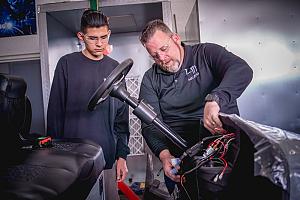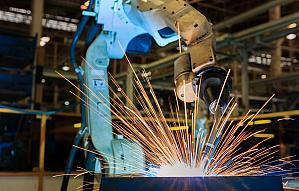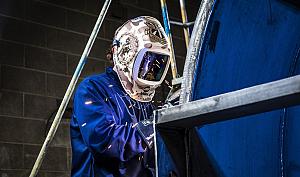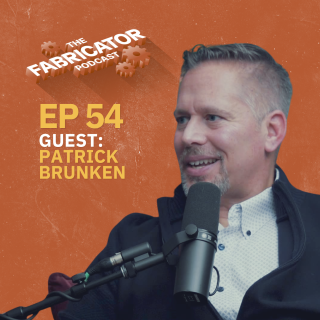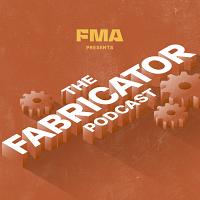New-school approach to an old-school family manufacturing business
Patrick Brunken, VP of Addison Machine Engineering, joins The Fabricator Podcast to talk about the tube and pipe industry, running a multi-generational family-owned business, keeping up with tube mill technology, and moving operations from Chicago to Reedsburg, Wis.
Brunken discusses the challenges and rewards of running a family-owned mid-sized company in the tube and pipe industry, and how his son has become the family's fourth generation to work in the business. He also about the changes in technology and the need for skilled workers in the industry. Brunken also mentions the growth in structural steel due to the increase in warehousing and the importance of serving the automotive industry. He emphasizes the importance of staying up-to-date with technology and the need for continuous learning in the industry.
Brunken also discusses the competitive landscape and the advantages of being a family-owned company. He mentions the challenges of working with new customers and the importance of building relationships with them. Finally, he talks about the rewarding aspects of his job, the excitement of working in a diverse industry, and the valuable resources the organizations like Fabricators and Manufacturers Association offer to the sector.
At the top, the guys about how a shop in Texas designed and fabricated the world's largest hex nut, which has been dubbed "Big Tex the Incredible Hex." The structure was built for Houston-area company Patriot Bolt.
Email us at podcast@fmamfg.org with any comments, questions, or suggestions.
In This Episode
Learn more about 2024 ALAW.
Learn more about podcast sponsorship opportunities.
Learn more about Addison Machine Engineering.
TRANSCRIPT
Patrick Brunken: Whereas we have some people, can you just jam it through? No, no. You're going to blow the machine up. But you get those conversations every day. Hey, you guys have been at it a long time. What do you think? We think you should not do it. And that is awful to tell somebody, right? But if it's true, it's true.
Sara Spring: Mark your calendars. The 31st Advanced Laser Applications Workshop will take place from June 25th to the 27th at the Suburban Collection Showcase in Novi, Michigan. This event connects manufacturers and suppliers in automotive, aerospace, agriculture, and the fabrication spaces. Enjoy three days of presentations from leading experts, cutting-edge demonstrations, and fascinating open houses. Discover the latest advancements and applications that are shaping the future of the industry. Visit fmamfg.org to learn more.
Dan Davis: Hello, this is Dan Davis from The Fabricator Magazine. Welcome to another exciting episode of The Fabricator Podcast.
Lincoln Brunner: There you go.
Dan Davis: Joined by Lincoln Brunner to my right. Also with our cast of characters, Brandon Geier, technical producer, Gareth Sleger. Some guy that sits back there and makes comments. Today on the program we have Patrick Brunken of Addison Machine Engineering out of Reedsburg, Wisconsin.
Lincoln Brunner: Reedsburg.
Gareth Sleger: Formerly Addison, Illinois.
Dan Davis: Yes. We talk about the move of the shop to Wisconsin. And Lincoln, you had a chance to go visit-
Lincoln Brunner: I did.
Dan Davis: Him recently.
Lincoln Brunner: It's great to get in shops like that because you get to see where the real action happens, and he's the real deal. What you see is what you get with Patrick, and it was fun to get in there and talk a little shop with him and see how they do things with their machining. And you see how machine shops have changed over the past 25 years. When I first started back in 98 at this outfit, shops were run differently and you see the new wave of young people coming in. It's pretty cool.
Dan Davis: Yeah, and it's our first time we've talked about tube production, large tube production.
Lincoln Brunner: And it's about time.
Dan Davis: Yeah. And it's pretty interesting. If you ever get a chance to watch tube mill in action.
Gareth Sleger: You know what else is interesting?
Dan Davis: This is a segue.
Gareth Sleger: Yeah.
Lincoln Brunner: Tell us, Gareth.
Dan Davis: What is it Gareth?
Gareth Sleger: The world's largest hex nut.
Dan Davis: Yeah. I don't think we're breaking news, but this is newsworthy of coverage.
Gareth Sleger: I'm sure there's a lot of people don't know that exists.
Dan Davis: You really think in our industry?
Lincoln Brunner: This guy in Texas goes and breaks the hearts of Slovenians everywhere with the largest hex nut.
Dan Davis: We need context now.
Gareth Sleger: JK Welding shop made a hex nut. Yeah, world's largest. It's what, 16 by 16 feet tall, 19 feet wide I think or something like that?
Dan Davis: Yeah, and the prior largest was in Slovenia we learned.
Gareth Sleger: Yes.
Lincoln Brunner: Yes. And if you watch the video, I mean, it only took him six weeks to make this thing. That's crazy.
Gareth Sleger: Yeah, only six weeks.
Dan Davis: Wow. So the Slovenian nut was only around since summer of 2020. So it only reigned for what, a couple years? Oh no, wait up. It's 2024.
Gareth Sleger: Yeah, the Slovenian one was about 12 by 13 and a half.
Lincoln Brunner: Which is no small potatoes.
Dan Davis: No. Who else better than a Texan to break the hearts of Slovenian huge nut makers.
Gareth Sleger: And the official name for it is the Big Tex the Incredible Hex.
Lincoln Brunner: Big Tex.
Dan Davis: It's a lot of words. Yeah. Oh, so it's made for a company. I just saw that for Patriot Bolt. I thought maybe he just did it for kicks. Although if you're going to make something like that, that's kind of neat I guess.
Lincoln Brunner: If he was really something, he'd make the bolt that goes in it.
Dan Davis: So anyway, we encourage more metal fabricators to make huge items of interest-
Lincoln Brunner: Of dubious value.
Dan Davis: We can talk about in The Fabricator podcast. And if you're Chicagoland area, we promise to sit down with you and discuss your large metal fabricated object of interest. Is there anything on your list you would like to see metal at about 20 feet tall?
Lincoln Brunner: Oh yeah. I think a giant guitar would be cool.
Dan Davis: Whoa, that's big. I think I would like to see a can opener.
Gareth Sleger: The world's largest can opener?
Dan Davis: Yeah, just like a church key looking thing. That'd be pretty cool.
Gareth Sleger: I'm sure somebody listening will start.
Dan Davis: I tell you that's one of the interesting takeaways when you go to a trade show in this industry is everybody's like cut a laser cut like-
Lincoln Brunner: Can opener?
Dan Davis: Bottle opener.
Lincoln Brunner: Bottle opener yeah.
Dan Davis: But I've got one in the shape of an alligator.
Lincoln Brunner: Bring in a picture next time.
Dan Davis: No, they're all in my refrigerator and all I drinks canned beer. So it didn't make a whole lot of sense, but whatever. So anyway, on that exciting note, on that exciting nut, let's jump into our conversation-
Lincoln Brunner: With Patrick Brunken.
Dan Davis: With Patrick Brunken.
Sara Spring: If you're involved in the pipe and tube industry, you won't want to miss the Pipe and Tube Conference this May in Omaha, Nebraska. This event is an excellent opportunity to connect with industry experts, stay up-to-date with the latest technologies, and explore new business opportunities. You'll leave the conference with a wealth of knowledge and new connections to help your business succeed. So mark your calendar and join us in Omaha for the pipe and tube conference. Register today at fmamfg.org. And now back to the episode.
Dan Davis: Patrick, thanks for joining us today.
Patrick Brunken: Thank you for having me.
Dan Davis: This is a unique conversation for us in the sense that we're talking about tube, manufacturing tube, related fabricating. We haven't approached that subject or broached that subject.
Lincoln Brunner: Not nearly enough.
Dan Davis: Although you can approach the subject, but we're broaching it right now. This is going to be an interesting conversation. Since Lincoln is Mr. Tube, I'm going to let him lead on this conversation.
Lincoln Brunner: Patrick, I'm very glad to have you in here for a number of reasons. Number one, you're a third generation and now into your fourth generation.
Patrick Brunken: That's correct.
Lincoln Brunner: Family ownership of Addison Machine Engineering. Can you tell us a little bit about what it's like to inherit and then run with your brother this business? What's that been like for you as a business owner?
Patrick Brunken: It's definitely different. You go to work with your sibling and then you have your other family conversations. And so for us it's been wonderful. We get along really well. We both fit a niche uniquely him on the manufacturing side and myself on the sales. So yeah, it's just been a nice interesting ride now that both my uncle's passed, my dad's passed. So it's just really him and I.
Lincoln Brunner: You and Jerry.
Patrick Brunken: Yeah.
Lincoln Brunner: Yeah. Now your son Patrick has become part of the business as well.
Patrick Brunken: Yes.
Lincoln Brunner: And what's that like for you as a dad who has spent his whole life in the family business? What's that like for you now to watch him come in?
Patrick Brunken: I think too, you don't want to be overbearing. What we went through back early nineties versus what they're going through today is totally different.
Lincoln Brunner: How so?
Patrick Brunken: Well, the technology's different. My grandfather was still alive, and this is a guy that lived through the depression and the wars and had a different mindset on business versus how we are today, the speed of which everything is going. So you don't want to overload and say, hey, you got to know now. You just can't do that to them because you don't want to push them away, but you want to pull them just enough and it is so hard. There was times we argued with my father. There was times we argued with my uncle. There was times we argued with my grandfather.
Lincoln Brunner: It's going to happen.
Patrick Brunken: It's going to happen. I remember my first day out of college working and my grandfather's like, "Hey, you got to call me Mr. B here." I'm like, "You'll always be grandpa to me, and I can't live with that." But that's the different mentality back then to now. So it is different. It is different, but it is a lot of fun too. I have a good son and so it makes easier for me. Yeah.
Dan Davis: I got in trouble a while back for calling a certain employees sweet cheeks, so definitely it's a new time.
Patrick Brunken: Yeah.
Dan Davis: They didn't appreciate that.
Patrick Brunken: Definitely.
Dan Davis: It was awkward.
Lincoln Brunner: Gareth has thick skin though.
Dan Davis: Those conversations make us stronger.
Patrick Brunken: We laughed about it the other day. We talked about punching a time card. Well, they don't do that. They don't even know what that means.
Dan Davis: Picture squaring up against a piece of paper.
Patrick Brunken: You slide that card stock in and you punch your time in. They don't have no idea what that meant. My brother and I and my cousin we were laughing because he has no idea.
Dan Davis: Yeah. So can you give us a little background on the company, maybe starting how your grandfather started?
Patrick Brunken: Yeah, no problem.
Dan Davis: Tell us about what it's doing today and where it's specializing.
Patrick Brunken: Well, my grandfather started, came over during the depression. He was born in Columbus, Nebraska, and then obviously was a farmer and it just wasn't working very well during the dust storms and depression. So he came out to Chicago, had a family member that was into turning buttons, manufacturing buttons, and he got into that. And then during the war, everything went away from metal because they needed all the metal that could handle. So they started doing other types of metal manufacturing. And then through the forties and fifties was under a different name and got into machining, turning, got into doing roll tooling and equipment repair for the tube and pipe industry out in Maywood, Illinois. So just the suburb of Chicago. But south side of Chicago, you're talking a lot of steel, right? A lot of manufacturing. So retired early sixties and then got back in 1965 and started Addison Machine up with my dad and my uncle in Addison, Illinois. So that's the real short version of how it all started. But without him it would be doing something else.
Lincoln Brunner: When did the company start building tube mills?
Patrick Brunken: Started building two mills late sixties. So we started with our first design built and manufactured. We still to this day do make everything in the factory by hand, by machine and assembly. So-
Lincoln Brunner: Right there in Reedsburg.
Patrick Brunken: Yeah. And then just the technology, there's two mills that have been around a hundred years. Obviously the design is correct just some a little bit of advancement. So yeah, late sixties, early seventies, and then continued to do that to today.
Lincoln Brunner: When you got involved, what they have you doing? When you started hanging around the shop, what they have you doing?
Patrick Brunken: Well, I think every family member that grows up your first job is cleaning the bathrooms. To this day, my wife loves the way I clean the bathrooms because my grandfather would come in or the guy that was the manager would be like, "It's not good enough. It's not good enough." And in time when you're 15, 16, you have no idea what they're doing to you, right? None. But it's prepping you. It's prepping you. And then as you get a little older, you go onto the worst machine because nobody wants to run it or it's a part nobody wants to do. And then you start with that appreciation of, okay, I get where they don't like what we're doing here. It's tough. It's a tough job.
Lincoln Brunner: It's your version of the school of hard knocks.
Patrick Brunken: Yeah, and exactly. And again, it's how my grandfather ran it. You're going to learn everything down here, and I appreciated that. Now when you're 15, 16, 17, everybody else is out mowing lawns or working in the mall or whatever, and you're in this factory and you got to be there before seven. You're like, I just want to get out. It's the worst job ever. And I think things have changed too. And the upper guys, the foremans or whatever, they didn't want to see you win. They didn't want to see you succeed. They're like, just keep that guy down there. But there was also guys who are really cool. But yeah, so you learn really, you got to move this, get on the truck, go there, pick up that part. And honestly, you don't think, again, at that time you're learning sales because you're meeting the guy in the shipping receiving department, and he's like, "Yeah, thanks for coming out." And then they give you a little tour and then you're bringing the parts back and forth. So at the time you're like, God, this really is not a lot of fun. But you're learning.
Dan Davis: Right, even if you may not know it.
Patrick Brunken: Right, exactly.
Dan Davis: When you were working, when you first started out, how was the business? Were they making tube as well as the machinery they made tube at the time?
Patrick Brunken: Yeah. So at the time we owned another company called Scientific Tube, and we were making small diameter stainless steel tubing. So growing up, you had the one Addison Machine who was making the equipment and everything else, and then on the tubing side making stainless steel tubing. And early on it was stuff for burners, gas grills-
Lincoln Brunner: All very small diameter.
Patrick Brunken: Yeah, very small diameter, inch and a half and under, and then it got into heat exchangers and then moving on into fuel systems.
Dan Davis: Oh, okay.
Patrick Brunken: Okay. So that company grew in a different way than Addison Machine.
Dan Davis: And eventually got out of the tube making game, correct?
Patrick Brunken: Yeah. We ended up selling scientific tube, but Addison Machine still making equipment for the tubing.
Lincoln Brunner: And how has that particular business, you talked about how much it's changed, what has changed in particular when it comes to turning tooling, when it comes to creating the machinery that makes all the tubing for everything you can think of? How has that changed at a technological level past 20 years?
Patrick Brunken: 32, 35 years ago, I mean, we're all sitting in here and rotary dial phones and no fax machines to fax machines, to push buttons then to the first computer. The same has gone on with the machinery. Old-fashioned lays, tracer lays, to milling machines where you had to send them everything up manually is now being done by CNC's and the controls are getting better, the stability of the machines and so on and so forth. So the technology is just exploded and it's continuing to get better. There's some things I'd like to see a little different, but we can get into that.
Dan Davis: Can you describe for our audience just what a tube mill does?
Patrick Brunken: Okay. A tube mill takes coiled steel in a flat state. As it goes through the tube mill, it starts to form into a round where it will get welded, sized, and then cut off to different lengths. Now you can get annealed tubing and there's different methods of welding, but the general concept is there's a forming section, a welding, sizing in a very small condensed version here.
Dan Davis: Yeah. And can two mills form various diameters of tubes or is there just a certain range, most of them are dedicated tube?
Patrick Brunken: Anything as tiny as a hypodermic needle to 40 inch pipe. Right. Obviously the technologies are different between each one. The way you would design the tooling for each is totally different. High-strength steels, stainless steels, everything changes.
Dan Davis: For a 40-inch diameter, how long is that piece of machinery going to be?
Patrick Brunken: It's a city block.
Dan Davis: No kidding. Wow. Wow.
Patrick Brunken: Yeah. We are very small when we walk through.
Dan Davis: Yeah.
Lincoln Brunner: Okay, yeah. You can almost walk through the tube.
Patrick Brunken: You can. Literally, you can. It's massive.
Lincoln Brunner: And so what range are you generally servicing when it comes to the tooling that you create?
Patrick Brunken: So the machines we make five inch tube in under is where we're known for. The largest diameter roll or tooling that we can do is 52 inch.
Lincoln Brunner: Wow. And you do create that?
Patrick Brunken: We do make that, yeah. We order to steal and we cut it down.
Dan Davis: What sort of application?
Patrick Brunken: Well, that would be for like a straightener that's making piling or structural bar that needs to be straightened. So we do a little bit of both. So we're into that side and tube and pipe along with bars and dyes and tooling that would straighten those.
Dan Davis: So as a company that serves the tube market, how is the market nowadays in terms of industry segments? I assume automotive was a huge part of it. Is it still like that or are there particular segments that dominate?
Patrick Brunken: Well, there is different segments within the automotive industry, so it's still oil-based, right? So you're still having fuel. So you're going to always have fuel systems-
Lincoln Brunner: Exhaust systems.
Patrick Brunken: Gas signs, exhaust system, frames, chair rails, doors. Everything is being done through tube and pipe roll forming for an automotive vehicle. It has slowed down a little bit, we all see that. But the future of it is just continuing going on and on and on. Even you look through here, all this is tubing. Everything we're talking in right now is tubing.
Lincoln Brunner: You were telling me in a previous conversation you've got right now a huge explosion in structural with all the warehousing going up. What's going on with that?
Patrick Brunken: Yes. That segment is, and everybody can see it. Amazons are on every corner now and they're 500 or a million square feet. Well, the shelving, all the shelving is just going crazy. A part I think a lot of people miss too is that a lot of these buildings are being partnered with solar on the roofs. Make a million square foot roof with solar panels that have-
Lincoln Brunner: Square tubing.
Patrick Brunken: Square tubing. Yeah.
Dan Davis: Is that an example of segments coming to the forefront that maybe weren't there like 10 years?
Patrick Brunken: Yeah, if you don't have your head in the sand, solar and wind and everything, it's obviously been pushed tremendously, but there's nothing to stop the structural steel market right now.
Dan Davis: Are building designers, engineers, design engineers, more aware of tubing as a metal part to be a part of their design?
Patrick Brunken: Yes. Yeah. And that's where it's being driven from. They come to us and say, hey, can you make this part? Can you make the machine that makes this part? Yes.
Lincoln Brunner: Well, it's an elegant way to design something that needs to carry a lot of weight, right?
Patrick Brunken: Exactly.
Lincoln Brunner: It's got a usefulness that more people that I'm talking to in the tube segment wish was being designed around. They're thinking it should be.
Patrick Brunken: And then they come back and say, well, this machine we bought in 1940, can it run this? I had a conversation this morning with a customer, can it run this? We want to push the limits of it. And it's like, well, it's not our machine, but design wise, can it fit? Sure. But you're going to have to beef up shafts or gears or bearings of some type to get it there.
Lincoln Brunner: What else, what other components of the tube mill has been stretched, as you say, of late? What are some other things about the machinery that have had to change with more current demands?
Patrick Brunken: Everybody wants speed. Speed, if you can go from 150 feet a minute on a product to 300. But you can't just say, hey, I need a new tube mill. Let's just pull that out. Well, if your welder can't handle it, your power coming in, your building can't handle it or the cutoff saw can't handle it, or your entry that there's no need to. Why upgrade the mill?
Lincoln Brunner: It's not even conversation like that.
Patrick Brunken: It's not even in the conversation. You're going to spend over a million dollars or half a million depending. Well, you got to increase everything else because you have a welder from 1960, 1970. Well, that's not only going to go so fast.
Lincoln Brunner: And that weld box can only handle so much.
Patrick Brunken: So much tensile strength or gauge. We're seeing tensile strengths going up and up and up.
Dan Davis: Has that been probably the biggest change in terms of materials that you have to work on?
Patrick Brunken: High strength steels, yeah.
Dan Davis: Yeah. And what kind of stress does that put on a tube mill design?
Patrick Brunken: When we run our analysis, so whether it's our design and we'll put it in and we'll do the layout or we run an FEA analysis to see where the strengths and weaknesses, at what point we are talking, a normal stand that we would make, can it handle those stresses? Where you would like to say yes is not always... So then that accounts for you need more passes, more stands, more tooling. The machine gets a little longer and that just because then it helps alleviate the stresses, the more passes, whereas we have some people, can you just jam it through? No. You're going to blow the machine up.
Lincoln Brunner: The high-strength steel, you need to massage it more so to speak, right?
Patrick Brunken: Yes, absolutely.
Lincoln Brunner: Yeah.
Patrick Brunken: But you get that. You get those conversations every day. Hey, you guys have been at it a long time, what do you think? We think you should not do it. And that is awful to tell somebody, but if it's true, it's true. We would never take on a job that you would look at and jeopardize the relationship for. We're fortunate definitely to say to our customers, no. It's okay to say no.
Dan Davis: Yeah. Do customers take no or do they try to find somebody?
Patrick Brunken: They'll find somebody else potentially. But it comes back like, hey, you were right or can you help? We get help. And that's okay too. That's okay too.
Lincoln Brunner: As a business owner, looking at the demands on your machinery and backing up one step, what kind of people you need to create that machinery? How are you coping with all of that to put together?
Patrick Brunken: The top questions everybody has today, how do we get more workers? How do we get people in to work a machine when we spent the last 30 years go to college? How do we convince, and we've discussed this at length in other places.
Lincoln Brunner: Yes.
Patrick Brunken: The Gen Zers or the ones right before them. Why would you come into the tube and pipe industry and stand in front of machine all day and make a widget part again when you got your other contemporaries on a computer all day or doing some fun different types? It's been very hard. We being very rural where we're at is just you have to start young. We start in high school. We are getting apprentices out. We're giving them opportunities to have an intern. We're giving them opportunities to say, hey, you can come here, you can make great money. There's plenty of overtime. You getting your healthcare, you're joining a family, not just my brother and I, you're joining a family of good employees that want to see everybody succeed, which has been tough to do, but you try to foster that and say, this is a we win together atmosphere. So there's not no competition. But every year, a couple every year, a couple every year and we're losing guys that have been there for over 40 years.
Lincoln Brunner: Right. So the tribal knowledge is walking out the door, you're trying to get young people in to start building that back up-
Patrick Brunken: Start building that knowledge. Right.
Lincoln Brunner: How do they react? Can you give us an example of a young person you've gotten in the door recently who discovered how cool it can be?
Patrick Brunken: Sure. So again, we've talked, we worked with the local schools and communities and we had one that was out working in a farm, wanted to be a farm farmer, farmer, farmer. And then something happened where he thought, well, maybe that's not a life for me. And then a buddy said, "Hey, these guys over here are looking for people. Why don't you coming out?" And very highly intelligent kid, 19 years old, and just starts getting it and he starts getting it, getting like, hey, this could be the future for me. And I think as we all sit here 30 years, it's gone. You blink an eye, it's gone.
Lincoln Brunner: Yeah.
Dan Davis: It's literally almost like the story for your grandfather, right?
Patrick Brunken: Right.
Dan Davis: Coming from Nebraska.
Patrick Brunken: Mm-hmm, exactly. So it's fun to watch these young guys. We're all thinking young guys, anybody who's under 40 and yonder, right? These really-
Dan Davis: Well, I don't know about that. No, you're right.
Patrick Brunken: These really young guys, 18, 19, 20, 21, 22, they are just, a lot of these kids are just hungry and they want to be treated well. So you just treat them well, you support them, you give them the tools to succeed, the guidance to succeed, and they run with it. That's the cool part.
Dan Davis: They still have to clean bathrooms?
Patrick Brunken: Yes and no. But my brother and I, we always say we're not above it either, and so we're cleaning the cafeteria or break room so that they know we have a passion for us as a group that we're there for them. And again, and as a business owner, it's not just the guys out there running machines, they come back with problems, personal problems too. So you're trying to do more than just being owner and telling them how to run a machine. You're trying to help them through as well.
Lincoln Brunner: It's a different atmosphere.
Patrick Brunken: Yes. I don't think you would've gotten that 30, 40 years ago. The mentality wasn't there for that.
Dan Davis: How many people do you have working for you?
Patrick Brunken: Right now, we have 52 between two shifts.
Dan Davis: Has that been consistent over the years?
Patrick Brunken: We've had to increase up. We're probably up about eight over the last three years. It's just business is just going on and it's getting more and it's getting more. So we've had to invest not just in people, but in equipment.
Lincoln Brunner: Well, and new space too, right?
Patrick Brunken: Yeah, new space.
Lincoln Brunner: You're just about ready to get-
Patrick Brunken: Yeah, we're almost there. Yeah.
Lincoln Brunner: Tell us a little bit about that.
Patrick Brunken: So we found a need where we're at, again, it's very rural. We've been able to expand as much as we could on our existing building, which spurred us into saying, okay, everything is jam packed and you're moving a forklift to move boxes from here to there to get a piece in there, and then you got to move that back and over.
Lincoln Brunner: Inefficient.
Patrick Brunken: It's so inefficient. Your lead man should not be on that forklift 10 hours a day. So we went out and we purchased an existing building that we've had to really re-gut from the ground up. But what we're moving in there is all our assembly of machinery. So our existing building, we're going to do only tooling and design of the tooling and reconditioning. And the other building, we're going to do all the machine building in there. And so we're prepping the floors for the weight and the crane overhead and just getting it laid out properly and gutting it.
Dan Davis: How much square footage did you have and how much were you adding?
Patrick Brunken: I'd say roughly 35 in the main building, and this one will get us a little over 10.
Dan Davis: Wow. So when you're setting up like a tube mill line, do you actually set it up and then take it apart?
Patrick Brunken: Yes. What happens-
Dan Davis: About a thousand square feet? Wow.
Patrick Brunken: Yeah.
Dan Davis: Wow.
Patrick Brunken: Yeah, you jam it in a corner and there's some machines that we have to turn on, customer wants to see it on. Sometimes we run material there as a prove out. But some of the larger machines you can't. There's no way. We don't have the power-
Dan Davis: To diagonally.
Patrick Brunken: So now we'll have the power and you're talking about a total of 400 horsepower machine, the power requirements to run that or turn the motors on.
Dan Davis: Oh wow.
Lincoln Brunner: A lot of juice.
Patrick Brunken: A lot of juice.
Dan Davis: How close is the new facility to the current facility?
Patrick Brunken: Two miles.
Dan Davis: Okay.
Patrick Brunken: Yeah, so it's really close. It's just on the other side of town and it works out great. So we're about a month out. Yeah.
Lincoln Brunner: Exciting.
Patrick Brunken: I was hoping to be a little sooner. We got a couple mills right now that we're squeezing in for prove outs in February.
Dan Davis: So when it's finally open, will you have to do some refiguring at the original facility to accommodate how you would like it set up for tooling?
Patrick Brunken: Yes. Yeah. So how we work now in most tooling manufacturers, you work in cells. So you got three machines in one cell doing maybe up to an eight-inch roll. Then you got the next cell that goes up to 14. There's three machines in there. Then you got the next ones that go into the twenties, and then you got the next cell that gets you up into the forties and thirties.
Dan Davis: How many machining centers do you have?
Patrick Brunken: 14. 14, 15.
Dan Davis: Wow.
Lincoln Brunner: And you're not talking about small pieces of metal.
Dan Davis: Yeah, you're right.
Lincoln Brunner: I mean you're talking about the tooling. You're turning out what's the worst-
Dan Davis: I mean, what's the cycle to produce one of those things?
Patrick Brunken: One of the larger ones?
Dan Davis: Yeah, like-
Patrick Brunken: Hours.
Dan Davis: Hours?
Patrick Brunken: Yeah, it's hours. And the way you buy the raw material in a round, right?
Dan Davis: Yeah.
Patrick Brunken: And then so it's soft. So it's kind of-
Dan Davis: Is it mostly... What is it?
Patrick Brunken: D2 steel is the majority of roll tooling.
Dan Davis: Okay, so like tooling still?
Patrick Brunken: Yeah. So D2, we get it in soft. It's raw material. We'll do all the rough turning, it's called rough turning. And then you have to send it out to be hardened. So you try to get all the geometry in pre-holes and everything. Then you got to have it get hardened. And that material comes back. And then we have another cell that does hard turning. And once that material's hard, it's much tougher to get it. So you're trying to get the rough turning size pretty close so that you're not-
Lincoln Brunner: Within 10,000.
Patrick Brunken: Yeah, yeah. Because when you're hard material, it's tough to do.
Lincoln Brunner: Well, that hardened material has to last forever.
Patrick Brunken: Yeah, yeah. I mean ultimately, and you regrind them. So customer, let's say they have five inch tooling. It's run it's cycle life. It can't run good product anymore. They'll send it to us, we regrind it or return it, bring all the geometry back so then they can run it again. So yeah, then there's a sell for just that.
Lincoln Brunner: That's a big business for you as well, isn't it?
Patrick Brunken: Yes. So not only is it always new, it's okay, hey, it's not making good product. Send it in. Then we do an inspection report on it, we tell them everything that needs to be fixed and then we bring everything back in and then we send that back out.
Lincoln Brunner: So your machining centers are busy.
Patrick Brunken: Yes. They're constantly. Yeah. If they could make an 80-hour day, we'd do it, but it's just not.
Lincoln Brunner: They're not making them.
Patrick Brunken: They're not making them.
Dan Davis: So what percentage of your business is dedicated to tooling and what percentage is dedicated to machinery?
Patrick Brunken: I had say it's probably two to one tooling. Yeah, because again, not only is it new tooling, it's also-
Dan Davis: Insistent need, right?
Patrick Brunken: Yeah. So in most companies, if we made the tooling, they'll send it back to us. There's other competitors they can send it to. But yeah, it's typically you work out a schedule like, hey, you're at a million feet. We come get it and bring it back to them. And that could take up to a week, 10 days, depending on how big.
Dan Davis: Yeah. How's the competitive landscape evolved, say over the last 10, 15 years? Has consolidation been an issue, international competition?
Patrick Brunken: There is international, but I think in our industry you get the feel of we want American companies. And obviously, we can service it faster. There are competition, but through attrition, that company now is owned by a bigger company and so on and so forth. And we're one of the few family-owned businesses still out there and are not owned by an investment group or somebody else.
Lincoln Brunner: And in terms of your customer base, are you serving other countries, other people?
Patrick Brunken: We do. We'll send some stuff into Canada and Mexico and some overseas. But it's usually because there's a United States company that's demanding that. Okay.
Lincoln Brunner: Okay. Do you miss anything about the way things used to be done or have the changes been a welcome change?
Patrick Brunken: I think as you look back, you miss some of the stuff, right?
Lincoln Brunner: Can you give me an example?
Patrick Brunken: Yeah, I mean it was, and again because it's a family business, not only would we work there, it was also sometimes our enjoyment as well, and we'd order pizza and play cards. This is before the computers took off-
Dan Davis: And then solitaire.
Patrick Brunken: Right, solitaire. But there was times that, okay, it was the first time you get computers and you can network. And we would sit down on a Thursday night and we'd all order pizza and then we'd all complain who would have the fastest PC so we can play a game against each other. So oh man, that one had four gig of ram or whatever, and this one's got eight, just not fair because you're playing a game like Duke Nukem or whatever it was back in the day. So long. Yeah, just stuff like that. You miss playing cards at break. I don't miss the smoking everywhere. That I can tell you. You'd walk in engineering and it'd be like a cloud. You'd have to crawl on your hands and feet because those guys would be there chain smoking on rice paper, doing everything. I don't miss that.
Lincoln Brunner: No, that's the way the newsroom used to be. Yeah.
Patrick Brunken: Exactly. So there are some things like that I miss, the break room, everybody's in there for 15 minutes playing Pinnacle or Spades or whatever, then back again. And it was like the routines that they used to be in, but the technology today is just faster and faster and faster.
Lincoln Brunner: That'd be fascinating.
Patrick Brunken: Yeah. And as we're older, you're like, God, I got to get faster. We're not programmed to get faster as we get older.
Lincoln Brunner: Quite the opposite. Yeah. You mentioned that your son is now in the shop, he's young guy, he's in his early twenties. What is his perspective on the business as opposed to maybe what yours was at that age?
Patrick Brunken: I think if I was him, and we've talked a little bit, you look at this place and you see growth constantly, you see it is just a little overwhelming. And I know when I went to college, they don't prep you for stuff like that as much as you think, hey, I'm the king of the world at 23, 22, and you walk in and you go, I know nothing. I really don't. So it is different versus having a father and a grandfather and the old-school mentality versus how my brother and I are trying to keep these young guys and him, the technology, the pull a little bit, but not so hard that you push them away. So it's clear definitions, I think from ownership and or supervisor, what your job is, and the goals and objectives of those jobs are important, whether that is showing up every day at 05:00 AM and making sure everybody's got their cup of coffee or whatever, to making sure you're buying all the parts for that machine that we're building and there's thousands of them. Both jobs are equally as important. Going out and making sure we got lunch in the days that we're making lunch that that's a goal and objectives, it's just as important as looking at the P&L statement. So it's an important thing. And I know some family businesses have missed some of that, but I think we were taught pretty good on stuff like that.
Lincoln Brunner: It sounds like it.
Dan Davis: What's the makeup of your workforce now? Have you successfully replace some of the people who had all those years of experience and no longer with you?
Patrick Brunken: Naturally though, after 38, 40 years, you're going to retire at that point. You're standing in front of machine. We just looked it up the other day. So the longest employee right now is 1978.
Dan Davis: Wow, okay.
Patrick Brunken: Yeah. 78, 80 and then all the way through. So I think we're right now probably 35 and younger is probably our biggest workforce where we still have the 60-year olds, 50 year olds and so on. So we got a nice mix. We got a nice mix.
Dan Davis: And do the generations seem to get along?
Patrick Brunken: Yeah. Oh, there's a lot of rubbing.
Dan Davis: I was about to say.
Patrick Brunken: I mean come on, how do you not, right? How do you not? It's always like, you have no idea. You have no idea. And I never wanted to do that. Go in and say, you have no idea what you're doing.
Lincoln Brunner: They know.
Patrick Brunken: They know. They know. They're getting their information in their hand. We got it from magazines and paper, so they're getting their stuff right away. They know what's going on. They know more than we do at times because they're more in tune. They want to know. They want to know now, instant, instant, instant.
Dan Davis: Does it work the other way in terms of maybe some of your more experienced workers not being as resistant to learning new things and maybe-
Patrick Brunken: Well, the quick and the dead right?
Dan Davis: Guess everybody understands that.
Patrick Brunken: If you aren't promoting yourself and if you're not staying up-to-date with technology and getting better and not being stagnant, it doesn't matter how old you are, you're going to be left behind because somebody good is going to pass you. So the technology in the machines has helped because old-school, tracer lathe to now everything is CNC. And then even then, we talked about it looks like an old DOS machine. Then the controls now are windows based. Sooner or later, if somebody's brilliant, they're going to put it in an Xbox controller or PlayStation. How much easier would it be to program that machine for a young kid or it's going to be an iPad based with apps and so on. And they're getting there. The technology is getting there.
Lincoln Brunner: A lot of the cobots are.
Gareth Sleger: There's a CNC laser cutting machine FastCUT, they operate on a Xbox controller.
Patrick Brunken: Yeah. They're getting there. You need to bring those prices down, but it's getting to that point. So yeah, the older guys that have been with us, they're learning, they're getting there. They want to increase because that only secures them.
Lincoln Brunner: Of course.
Patrick Brunken: Listen, mid-fifties, we're still ways away. Even in your early 60, you're still ways away from getting out.
Lincoln Brunner: You need to keep up.
Patrick Brunken: Yeah.
Dan Davis: What do you see as the advantage to being a family-owned mid-sized company versus some of these other people you described that have maybe P&E money rolling into it?
Patrick Brunken: Yeah. There are things we cannot do, and we know it. When you come to those grips like, hey, we cannot go out and buy a million-dollar machine. It's never going to happen. Are we going to buy the fifteen-year-old machine, twelve-year-old machine? Sure. And we're totally okay, and we will never compete against that. Where we're going to win is on the people we hire that can make that machine run better and the knowledge in that. And then there's the family part where, hey, you got to go help so-and-so because somebody's mom needs help or whatever, get your butt in the car and we'll go do some community service, which I don't think you would get at some of these bigger companies, which is fun as well. Trying to be known as servants in the community. Yeah, so it's cool too.
Lincoln Brunner: Well, in a community like Reedsburg that can only bode well long-term, where the people come to know you as the good guys. Hey, so-and-so needs a job. He's 24, he doesn't kind of drifting. Maybe you guys could take a look at it.
Patrick Brunken: That's our goal, that's our goal. There's something to be said for that kind of reward versus a monetary. It goes a long way. I mean it does for us, whether that makes us different, I don't know. But I think if everybody sat back and said, hey, you can help this community member, that goes way more than in dollars and cents.
Dan Davis: Customer base, how does it work out in terms of the customers you serve in the US? All over the place?
Patrick Brunken: All over the place, from east to west. All the way in between little small towns. Like I said before, everything from hypodermic needles, to big structural steel, to this, to roll forming, to doors, to frames, to... Everywhere you look, there's metal fabrication going on, and everywhere you look in small towns and big towns, there's a mom and pop place just starting up, or there's one that's been there for 70 years and it's so cool to go in and see what's going on.
Dan Davis: Are you bullish on manufacturing in the US?
Patrick Brunken: Yes, very.
Dan Davis: Yeah.
Lincoln Brunner: Why so?
Patrick Brunken: Very. Everywhere we turn, everyone's busy. And if somebody's saying, oh, well no, they're lying. They're lying.
Lincoln Brunner: Well, nearshoring has taken hold across a lot of different segments from what I'm seeing, especially with the structural, especially with automotive, you've got a lot of people saying, hey, this is a North American imperative.
Patrick Brunken: You have to be, you have to be. We don't want jobs shipping overseas. Everybody agrees to that. You can't be that naive. Yes, big companies, we can make it cheaper here, but there has to be an incentive for here. And if you don't, again, a mom-and-pop place or somebody with enough intelligence, and we're going to go get that. We're going to go get that, whether it's a bearing or drive system or something, somebody's going to go do it. But yes, our outlook, what we talk about when we're talking to a hundred different customers in a segment from oil, to energy, to automotive, to gas, and you name it, everybody's like, yeah, we're busy. We're trying to replace older equipment. We're trying to train our people. That's the biggest segment we're seeing today. Hey, can you help us? We lost our guy that had the black magic. Can you come in and help? And in some instances we can, in some instances we can't. And that's the fun part. I think so.
Dan Davis: And when you can't, is it typically somebody else's equipment or is it just too out of-
Patrick Brunken: Yeah, yeah or it's just like, hey, we're machine builders. We're not not experts in welding. You need to... I think they want to go like, hey, click Amazon. Give me everything. And it's not there. You're going to have to partner with us, with you, and you, and you. We're going to have to all go in and say, hey, we all have to agree that if you, we think this, you think this, this, this. And then let the customer make the decision then on that part.
Dan Davis: Are you still developing machinery for people who are new to tube?
Patrick Brunken: Yes.
Dan Davis: Wow, that's interesting.
Patrick Brunken: Yeah, we have one right now.
Dan Davis: No kidding. Wow.
Patrick Brunken: Getting into the automotive.
Dan Davis: Is that a better customer to work with?
Patrick Brunken: No, it's so hard. It's so hard. I hope they're not listening because they know who they are. We won't say we won't say but-
Dan Davis: I'm pretty sure they're not listening.
Patrick Brunken: It's a lot of handholding.
Lincoln Brunner: Well, don't say that.
Patrick Brunken: What is this? What is that? Where you have an existing customer, they just give me the machine and get out of the way. Okay, and we get that too. But the newbies, they're starting from scratch.
Lincoln Brunner: Can you hold my hand please?
Patrick Brunken: And it is.
Dan Davis: Do they have any idea when they get... I mean obviously they've done the financial and yeah.
Patrick Brunken: It looks so easy, right?
Dan Davis: And I assume they probably went to go see somebody else's line and like, oh wow.
Patrick Brunken: Yeah, no problem.
Dan Davis: Yeah, look, it's coming out fine..
Lincoln Brunner: And how many hundreds of things can go wrong from strip to finish product?
Patrick Brunken: Yeah, and let's take the assumption. You got great material coming in, which is not always the case. Your setup has to be perfect or the end forming of an automotive part is never going to work. It's going to split and so on. If you don't have the right weld and you're not checking and doing this and that, there's so much more to making a tube mill or tubing, then there's quality checks, there's inspections and this. And when you start from scratch, you don't know that. You got all the ISO and TS and this and that, and you got a higher quality guys. And if you've never run a tube mill before, that's great. 10 years from now, something's going to happen you've never seen before, five years down the road, and then you're going to be like, what's going on?
Dan Davis: Do you actually, in a case like that, work with someone who is actually in charge of running the line and has no experience?
Patrick Brunken: Yeah, we do and we do training to help with that. But our recommendation is always go out and try to get somebody, whether you have to hire somebody in or what have you, get a consultant, somebody you are going to need every day because again, my job's not as to handhold you through the... We get you the machinery and stuff, but your day-to-day stuff, I can't get a phone call at 02:00 AM saying, well, I don't know what I'm doing. I build the machine. I don't show you how to run it.
Dan Davis: Exactly, exactly.
Gareth Sleger: But I imagine the newbies are good for business though, right? Is there a certain sector where you're seeing more "newbies"?
Patrick Brunken: No. I think you see the company that does a widget here where they're buying tubular product today and they're asking, hey, am I at the limit of making my own, control my own destiny? Because obviously you're going to strip suppliers and material and one month is there, one month is there. Are you making a spot buy? Are you buying a year out? So you get those fluctuations where now then you're making product for yourself. You can control some of that. But there is so much that goes into that. You need water, you need all the welding gases, and it's just so much to start from scratch. Is the floor that you're putting the machine on structurally sound enough? People don't even think of that.
Lincoln Brunner: How many feet of concrete do you have under there?
Patrick Brunken: Yeah. I mean, there's so much more. And yeah, we're machine builders. We can only give you so much, but we can't do that for you. You're going to have to hire your own engineering firm and so on and go that route. What we try to do is marriage as much as we can. Here's a list. Here's who you might want to look at for X, Y, and Z, and then let them make that call.
Dan Davis: How long is the cycle from first call to installation in a situation like you're describing with a new customer?
Patrick Brunken: In this instance, it's about five months.
Dan Davis: Wow. Oh man.
Patrick Brunken: That's fast. Because it's smaller machine.
Dan Davis: It takes a year, two years to plan a wedding.
Lincoln Brunner: You're doing that in five months?
Patrick Brunken: Advantage us, we make everything on our own. There are some things we have to farm out bases or what have you, but we control, again, our own destiny because we are one of the few. We make it in-house, we make it with our own hands.
Lincoln Brunner: You weld it, you paint it.
Patrick Brunken: Yeah, yeah. So it's great. Anybody ever do a big Lego project and they come in and there's that bucket, it's like this big. It's very similar. Engineering makes that book. Everything needs to get ordered, everything needs to then get assembled together. So not just made, but we got to put it all together like a giant Lego.
Dan Davis: Right.
Patrick Brunken: Yeah. So that's cool.
Dan Davis: So this might be a stupid question, is there someplace somebody goes to learn about tube production?
Patrick Brunken: They should come to the FMA.
Dan Davis: Right. I mean-
Patrick Brunken: Hey, I talked to a guy today and we just talked about it today. He's an FMA member, older gentleman, and didn't even realize that you have these kinds of tools at your fingertips. It's like you get your head stuck in the sand and you're like, I don't even know where to go. You know where to go. There's Edison Welding Institute if you want to learn about... There are places you can go to educate yourself. But I would highly recommend finding somebody who's run a tube mill before.
Dan Davis: Right. Yeah, it just strikes me, back in the day, people would be attending a trade school to learn a tool and die. And it made me wonder whether there was a specialty program for developing roll forming or tube forming.
Patrick Brunken: There are. And I know the FMA puts on some roll form stuff and tube and pipe. I think it's tough because sometimes it's at an eagle view versus some of the stuff we do is just really the hands-on stuff. But there are tools out there and it just, everybody's so busy. It's hard to say, hey, go home at night and read that article and it's a white paper and they're looking at it going, you want what? I just want to watch the news or I want to watch my brain numbing show because I just got my rear end kicked all day or all week.
Dan Davis: Our podcast about white papers didn't take off.
Patrick Brunken: See. No, I can imagine.
Dan Davis: We'd just the white paper.
Patrick Brunken: What is so fun about reading a white paper? I didn't want to do it in college.
Dan Davis: Ripping on graphs, audible format is not the best. Very small audience.
Patrick Brunken: No, absolutely not. I mean, again, our attention span gets you one page in and you're like, I have no idea. Now don't get me wrong, there are guys that live for that stuff and those little people you need to find for sure.
Lincoln Brunner: What do you find as a business owner, as someone who's out there doing sales all the time, what are you finding right now the most rewarding part of your job? What's the most difficult for your segment?
Patrick Brunken: The most difficult, I think like anybody, you go in and you made a mistake, mistakes happen. You screwed up something. You know you're going to get it. So you got to be willing to go into those tough situations and say, all right, hey, I know we made a mistake. You may never want us in here again. We're going to stand by it. Those are hard. Nobody's perfect. And that's okay. We get it. We try to minimize those as much as possible.
Lincoln Brunner: Well, the relationship comes in.
Patrick Brunken: And that's where the relationship comes in is like, hey, you've bailed our rear end out multiple times, so then the ass beating is not so bad as we would say.
Lincoln Brunner: You get them all again.
Patrick Brunken: Yeah. So those things are tough. Those are really tough. The projects are on the cusp of what you cannot do. It's frustrating. We're right there. It's just out of our limit of being able to help. And maybe you can help by saying, go here or go there, or this is what we're thinking. The most rewarding is, it's so cool to be out there and see people from such a diverse background and you really realize how blessed, how small you really are when you start looking at people south, north, northeast, the rust areas to out in California is so different. It's really neat to see the different mindsets of somebody in California or out west versus a Midwest person. It's just so different. And the guys on the shop floor versus the purchasing agent or the engineer that you're dealing with. That's the fun part.
Lincoln Brunner: Very cool.
Patrick Brunken: Definitely.
Dan Davis: Is your son seeing that same thing? How's he seeing the family business in your opinion as compared to maybe how you saw it when you were his age?
Patrick Brunken: I think he's walking into something a little better where we were at that transition stage of a 90-year-old German who was maybe not so willing to change to CNCs when they first came out or even push pad telephone. Now my brother and I's mindset, go find that machine that can do it faster. We sent him and one of our lead men out who was only 28 years old almost to North Dakota. You two guys go and you bring that report back. So I think he's seeing it like, hey, you're here to make our decisions easier, which in turn, you're learning what those decisions should be. So I think that nowadays it is a little bit easier and I think the excitement level is there. And then I think he sits there and go, I can't wait until I'm 30.
Dan Davis: Hang it up. Go down the Caribbean,
Patrick Brunken: He's out on a forklift moving beams in zero degree weather. And we laugh, my brother and I are laughing like, "I'm glad it ain't us."
Lincoln Brunner: I'm glad it ain't us.
Dan Davis: Pay your dues kid.
Patrick Brunken: Yeah, there's a 23-year-old out there and a 21-year-old out there. It's like, have at it. I know that my old bones aren't going to do it.
Lincoln Brunner: Welcome to Reedsburg.
Patrick Brunken: Welcome to Reedsburg. Right. So I think the learning curve will be faster because they are, I hate to say it, these kids are way smarter than we were.
Lincoln Brunner: I don't doubt that.
Patrick Brunken: I'm not kidding.
Lincoln Brunner: Well, I was-
Patrick Brunken: Because some of the things they talk about, you're like, you're way great. Great.
Lincoln Brunner: You got young people commissioning machinery at your place. I mean you're getting in that new, I think you have a new Mazak turning center.
Patrick Brunken: Yes, we do.
Lincoln Brunner: And you were looking at this young guy who's the lead guy and getting that thing running.
Patrick Brunken: Getting it running.
Lincoln Brunner: That's pretty cool.
Patrick Brunken: Figuring out the bugs. We had just gotten it a day before you had come and now it's up and it's got a Windows error where we would all be like, turn it off, turn back on. Hit the reboot button-
Dan Davis: Shake it.
Patrick Brunken: And he's got the controls and he'll eventually figure it out.
Dan Davis: Please do not shake machining center. It'll fall on you.
Patrick Brunken: Please don't. But he's going to be out there and he figured it out. He goes through and troubleshoots and where we would sit there and go through a three ring binder that's this thick, trying to figure it out, these guys are on the website and they're looking at YouTube videos. Hey, there's what's wrong. Do this. So the search for knowledge is fast. How often are we looking on YouTube videos going, my wife wants me to do this. I have no idea. Let me go figure it out.
Lincoln Brunner: I don't know how to fix a dryer.
Patrick Brunken: Yeah, come on. So where they have that technology and they can get that answers a whole lot faster.
Lincoln Brunner: Well, it's got to give you some peace of mind. I've got really capable young people in here figuring stuff out that I wouldn't figure out.
Patrick Brunken: And we as the gray hair group, we have to be willing to accept their answers at times, even when we know it might not be the best one because there is a learning curve in there, but we can't just be like, I don't want to say old school, whatever, whatever. Go run that machine, whatever. You haven't been here long enough to figure. Go over there. So you can't be that way. You can't. And you got to hopefully understand and identify their strengths and weaknesses. You get one child that's creative and has all this, and then you have the other one that's just got this worker straight mindset, this is what I want to do. And okay, two different types of people. And then we can't just take one and say, nope, you're going to go there and then you're going to do that just for sake of learning. That might not be the best thing either. So I'm learning. My brother and I are learning. We're like we were always on the other end. Now all of a sudden it's blink of an eye, you got fourth generation and another one will be coming pretty soon and another one after that. Hopefully, you got to be willing to get them going in the right direction as well.
Dan Davis: Do you think there that, would it be the fifth generation?
Patrick Brunken: Well, wouldn't it be great?
Dan Davis: Yeah.
Lincoln Brunner: Sure.
Patrick Brunken: Yeah. I have a grandchild on the way, but that's a long way to go.
Lincoln Brunner: They're not starting that young.
Patrick Brunken: Yeah no.
Dan Davis: It was eye with you start working-
Patrick Brunken: Sometimes you feel like, how long have you been working there? Well, how long could you work in a shop back then? 12 years old, right? Cleaning garbage, mow the lawn, tuck pointing. I mean stuff. You're like, what?
Lincoln Brunner: There're a laws for that now.
Patrick Brunken: There is laws for that now.
Dan Davis: Everything's changing. Change is constant.
Patrick Brunken: Yeah. Always, always.
Dan Davis: Awesome. Well thanks so much for joining us today, Patrick. Really enjoyed it.
Patrick Brunken: Yeah, anytime.
Lincoln Brunner: Real pleasure having you on.
Dan Davis: Where can they find out more information about Addison Machine Engineering?
Patrick Brunken: Definitely go on our website, ameinc.com. Addison Machine Engineering Incorporated, that's what it stands for. But ame.com, and just check us out. And if you need help, don't be afraid to go to the FMA, right? Don't be afraid to get involved and be part of a group. The combined knowledge of individuals in a room is always greater than you're trying to figure it out yourself. And don't be afraid. Go get that knowledge, go search it out with this community I would say would be the one thing I'd leave behind.
Dan Davis: Awesome.
Patrick Brunken: Go get it.
Dan Davis: Yeah. The Tube and Pipe Journal is right there for you.
Patrick Brunken: Yeah, that's right. Yeah.
Dan Davis: Anything else, Gareth? Well, all right. Okay. Well, if you have any comments, questions, or concerns, maybe I'm looking a little ill today. I don't know. Let us know at podcast, at fmamfg.org or tell your friends about this podcast. Leave a comment wherever you get your podcast. I think that's everything. Send us a note and we'll send you a T-shirt. This got to be a good note.
Gareth Sleger: If you made it all the way through, you'll hear this.
Dan Davis: Yes. There you go. All right, bye.
Sara Spring: The Fabricator Podcast is a production of Fabricators and Manufacturers Association located in Elgin, Illinois. The show is hosted by Dan Davis and the staff of FMA Communications. The podcast is produced by Gareth Sleger, and recorded and edited with the help of Brandon Geier. Sale support provided by Andy Flando. Additional production support by Elizabeth Gavin, Dana Wiker, Mary Diamond, Mike Owens, and me Sara Spring. Thank you for listening.
ABOUT THE FABRICATOR PODCAST
The Fabricator Podcast brings you conversations with people in manufacturing who make things out of metal. We speak with manufacturers, metal fabricators, welders, job shop owners, small business entrepreneurs, artists, marketers, educators, and more. Host Dan Davis also goes beyond discussing just manufacturing and the skilled trades, and chats about pop culture, current events, food, music, movies, comedy, and, of course, robots. The Fabricator Podcast is presented by the Fabricators and Manufacturers Association.
We shape the conversation around metal.
Host: Dan Davis
Producer/Editor: Gareth Sleger
Video Producer/Editor: Brandon Geier/Dana Wiker
Ad writer/spokesperson/social media: Sara Spring
Graphics: Billy Kulpa
Marketing support: Elizabeth Gavin, Pat Simon
Sales support: Andy Flando, Amy Hudson
Web support: Mike Owens, Jared Carlow
Additional support: Ed Youdell, Maurine Semevolos, Lincoln Brunner, Tim Heston, Rafael Guerrero, Josh Welton, Darla Welton, Amanda Carlson-Hicks, Callie Check, Rick Lehnhardt, Judy Steinbach.
Where to listen to The Fabricator Podcast:
Follow The Fabricator:
Where to Listen
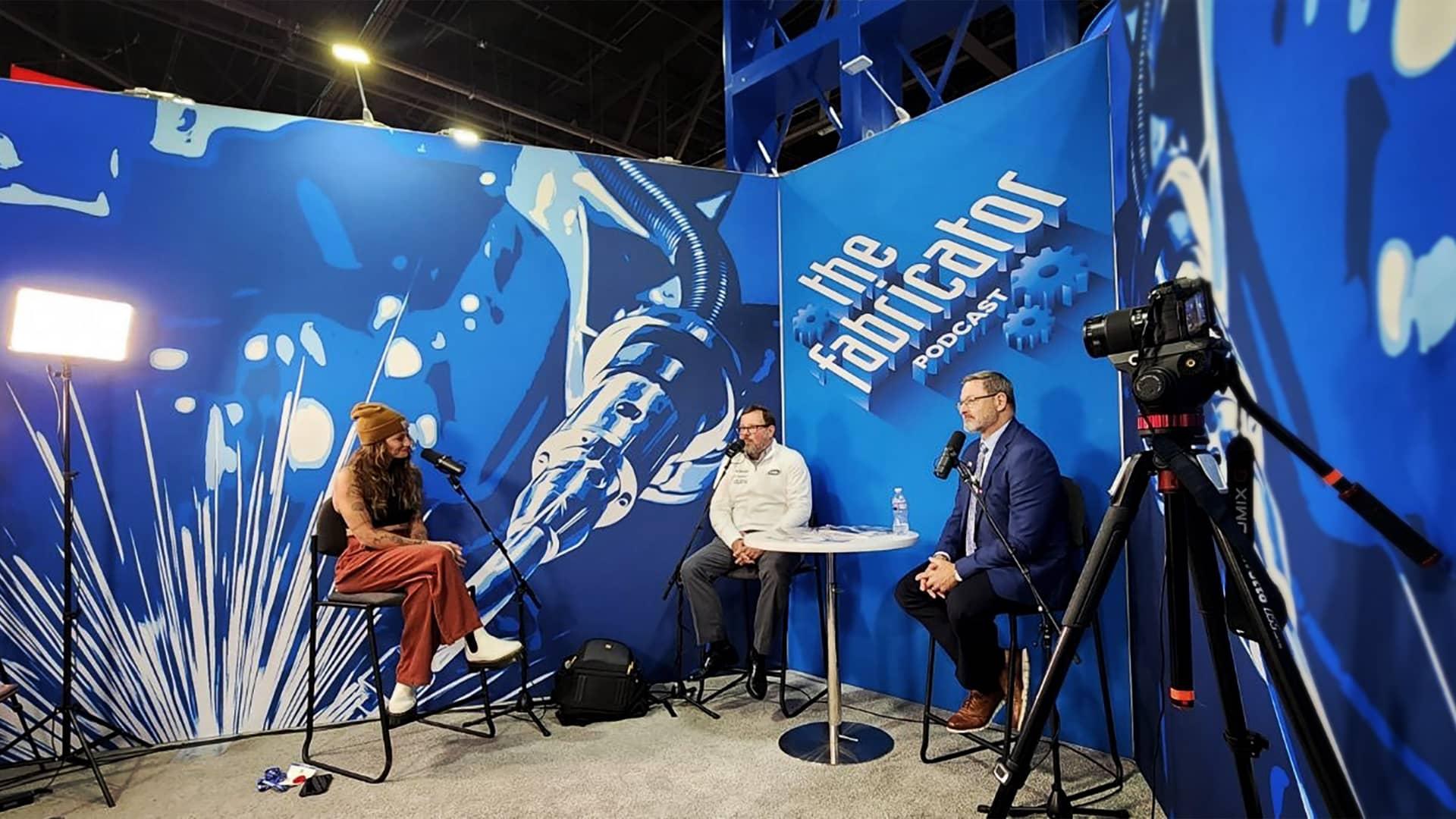
About This Podcast
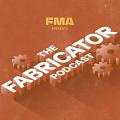
All Episodes
-
 Ep. 055
Ep. 055 -
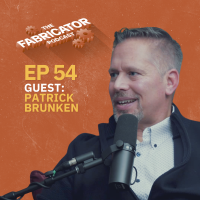 Ep. 054New-school approach to an old-school family manufacturing business
Ep. 054New-school approach to an old-school family manufacturing business -
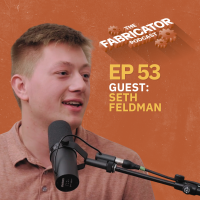 Ep. 053
Ep. 053 -
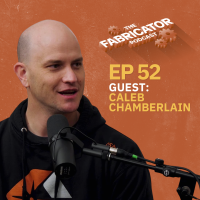 Ep. 052
Ep. 052 -
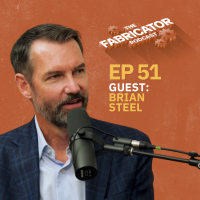 Ep. 051
Ep. 051 -
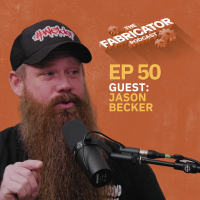 Ep. 050
Ep. 050 -
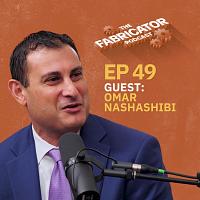 Ep. 049
Ep. 049 -
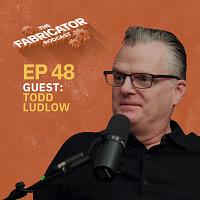 Ep. 048
Ep. 048 -
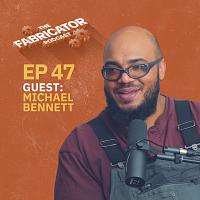 Ep. 047
Ep. 047 -
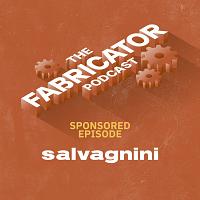 Bonus
Bonus -
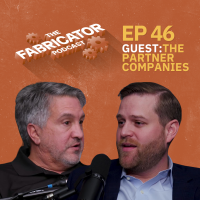 Ep. 046
Ep. 046 -
 Ep. 045
Ep. 045 -
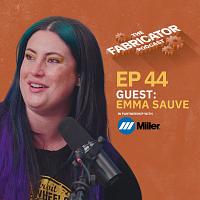 Ep. 044
Ep. 044 -
 Ep. 043
Ep. 043 -
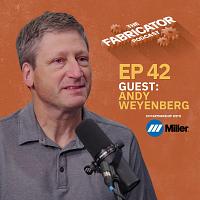 Ep. 042
Ep. 042 -
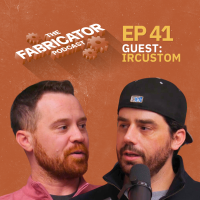 Ep. 041
Ep. 041 -
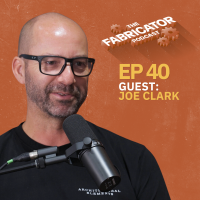 Ep. 040
Ep. 040 -
 Ep. 039
Ep. 039 -
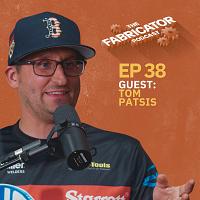 Ep. 038
Ep. 038 -
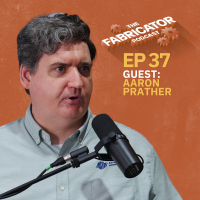 Ep. 037
Ep. 037 -
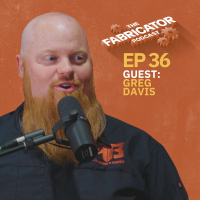 Ep. 036
Ep. 036 -
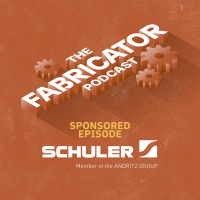 Bonus
Bonus -
 Ep. 035
Ep. 035 -
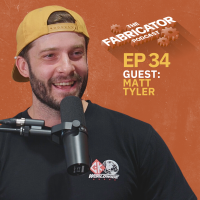 Ep. 034
Ep. 034 -
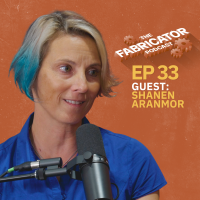 Ep. 033
Ep. 033







